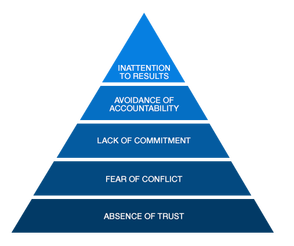Why is it so hard to build the trust that’s essential for productive conflict as a team doing ministry?
If you’ve ever delved into Pat Lencioni’ s The Five Dysfunctions of a Team you’ve got the idea that trust is a foundation for any team–and only on that trust, can a team truly engage in healthy, productive conflict.
 Pat Lencioni’s Pyramid of the Five Common Dysfunctions of Teams
Pat Lencioni’s Pyramid of the Five Common Dysfunctions of Teams
One of the barriers to this, however, can be the “accidental values” in an organization. These are the values that aren’t intentional and actually hinder the long-term good of the organization.
Another barrier to trust is the “fundamental attribution error.” This is the tendency in an organization to falsely attribute the negative behaviors of those whom we disagree with, who are newer to an organization, or otherwise on the margins to their character (an internal attribution), while attributing one’s own negative behaviors to environmental factors, like a decision made by someone else, etc. (an external attribution).
Organizations with teams that hold onto “accidental values” or are prone to the “fundamental attribution error” in decision making will likely struggle to build the trust essential for a healthy organization. At its heart, organizational health for a ministry means that the body of believers who have been first joined together in Christ, and now come together for a specific purpose, are consistently living out strategy and operations within a culture and values that all hold together–that make sense, that are consistent.
Organizational health starts with a team. And then spreads to other teams. A team of teams. A culture, values, norms, and way of being that’s best caught, rather than taught.
Truly living as a team is a difficult thing, a very specific thing. It means more than simply being together or working together. This is another stumbling block for many organizations–assuming that “we” are a team, when it’s not the case. Lencioni explains:
a team is a relatively small number of people (anywhere from three to twelve) that shares common goals as well as the rewards and responsibilities for achieving them.
Many groups that aren’t true teams succeed. There are good reasons not to be “partially” a team without going all-in on trust and productive conflict. Even within the Body of Christ, people can get hurt when there’s a pretense of forming a team, without commitment to the tough values of trust a team requires. As Lencioni cautions:
if your group is not meant to be a team, it’s far better to be clear about that than to waste time and energy pretending you’re something you’re not. Because that only creates false expectations, which leads to frustration and resentment.
In summary, these three challenging barriers to overcome in building trust as a team are:
What have your experiences been? What, for you, has been the most challenging hurdle to becoming a trust-filled team in ministry?
Advertisements Share this:




